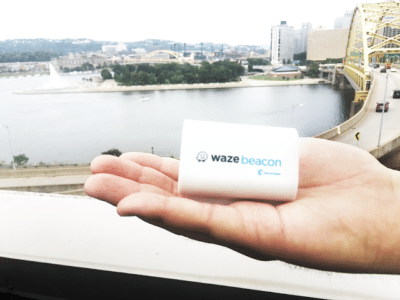We’ve probably all had it happen. You’re driving along and your route takes you inside a tunnel where, suddenly, your GPS device is completely useless and you find yourself squinting along at signs trying to figure out which lane you need to be in. Because GPS signals are transmitted from satellites, dense cover and underground locations (like tunnels) have always been a challenge. While manufacturers have managed to improve GPS technology so many devices can keep signals in dense undergrowth and in canyons, having a signal underground is a different challenge altogether. But, it looks like Google’s secondary navigation company Waze has a solution.
The Waze Beacons Program uses modified Bluetooth beacons in order to communicate location with your device. From what it looks like, the beacons currently will only work with the Waze app, but the signals are unencrypted so other manufacturers like Google or even Garmin, could take advantage of them as well.
Currently, the Waze Beacons have been deployed in two Pittsburg tunnels, Pitt and Liberty, and in a tunnel in Israel as well. According to Waze, deals have already been negotiated in Paris and Rio de Janeiro, but I couldn’t find any information on when or exactly where the beacons would be deployed.
However, before this awesome technology can become mainstream in every city, there’s a bit of a catch. In order for a city to deploy the beacons, they have to apply to the Waze Beacons Program and then purchase the beacons. Each beacon costs $28.50 and around 42 beacons are required to cover each mile of tunnel. That comes out to a minimum of just under $1,200 per mile of tunnel. While that might seem like a lot to you or me, it actually isn’t that bad of a price in the grand scheme of things. The beacons have a an IP67 rating so they can withstand the industrial cleaning equipment that is commonly used in tunnels. The expected battery life is around six years.
Of course, as you probably know, Bluetooth beacons are far from new. However, this is the first instance I have ever heard of where they are being used for something other than marketing or, at their most optimistic, a complicated form of indoor navigation. Generally speaking, Bluetooth beacons are usually expensive, a little finicky, and their relations with commercial advertising have given this powerful technology a bit of a bad name.
Regardless, this is a pretty exciting development in the navigation industry. And, the fact that Waze seems confident enough to share this technology with competitors also gives me quite a bit of hope. Perhaps if it becomes widespread enough Garmin might find a way to incorporate it into their devices, although that admittedly seems like a bit of a longshot. We’ll just have to keep an eye on it and see if it goes anywhere.


hmmm, it’s interesting